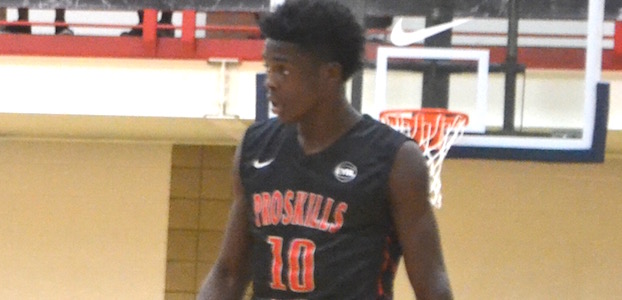While some of the biggest questions surrounding Louisville’s current NCAA scandal revolves around how it could potentially impact the Cardinals on the court, another area that will be dramatically affected is recruiting.
It’s pretty obvious that like North Carolina, who has struggled for a couple of years in recruiting with the cloud of potential NCAA sanctions hanging over the basketball program, Louisville could have big trouble in the coming years landing quality talent if they’re on NCAA probation, or if Rick Pitino decides to suddenly retire — though he says for now he has no plans of going anywhere — or if the program starts to struggle, which could be a direct production of probation and/or Pitino’s departure.
UofL currently has one pledge committed in the class of 2016 — 5-star wing V.J. King — and has a handful of others on the radar. Two of those prospects, California big man T.J. Leaf and Texas guard Andrew Jones, made their way to Louisville for official visits the first week of October, just as news of the scandal broke. Jones’ father spoke with USA Today about his son’s trip to Louisville.
“This wasn’t no put on. They were themselves. Rick Pitino was great,” said Mr. Jones. “I thought he was great. There’s nothing that I can that was phony about the program at all. I thought everything was set up perfect. A lot of times, everybody wants to put on and show their best, and you don’t get to see the real deal. They went about their business as if it was an ordinary day.”
Mike DeCourcy of The Sporting News broke down some of the complexities involved in this unique and sordid situation.
“The issue is the potential of extra benefits in the recruiting process,” said DeCourcy, “Perhaps to roster players. Those are the questions that have to be resolved by Louisville’s internal investigation, as well as anything the NCAA might transact on its own. Those questions raise the specter of the potential of NCAA sanctions. And when you get that out there into the ether — into the recruiting world — that’w when it becomes a real problem for Louisville.”
Pitino and his staff got a good one in King, one of the top perimeter talents on the East Coast. But they’re going to have to consistently land multiple top 100 players to be competitive year in and year out in the ACC. With the looming threat of NCAA sanctions and other potential penalties, recruiting may have gotten a whole lot harder for Louisville. Louisville’s competing rivals will tell recruits horror stories of not getting to play in the NCAA Tournament, having to face scrutiny and ridicule, and how it just isn’t worth the risk of joining the UofL program at this time.
“Louisville already has to work really hard in the recruiting process, because they don’t have a great local talent base. And they do certainly have a great brand, a great fanbase, and one of the all-time great coaches. But it’s not resulted in a lot of big recruiting wins for them,” said DeCourcy. “They had a nice recruiting class a year ago — one of their better ones. But even when they were churning through Final Fours and a national championship in 2012 and 2013, they were doing it mostly with players who were at the edge of the top 25 — guys like Peyton Siva — or complete finds, like a Russ Smith or a Gorgui Dieng. When you start having to struggle in recruiting a little bit, that’s a problem.”
“When they won their championship and they made their Final Four in 2012 and 2013, they were members of the Big East at that point. And the Big East was a coach-driven league, in which you could have players, and you could win big in that league with coaches coaching coachable players, who stayed until they were veterans,” DeCourcy continued.
“In the ACC, you’re going up against a much higher level of talent, that’s usually gathered by North Carolina and Duke. And so it’s a little more difficult to compete night in and night out. So you have to get very good players.”
“Louisville’s recruiting was really at kind of a fork — a crossroads kind of deal — and they needed to do well here in this particular class. And instead, they’ve got to deal now with this negative publicity, and the possibility of negative recruiting against them. I think all in all, I think Louisville picked a very bad time to wind up in the NCAA’s crosshairs.”

















